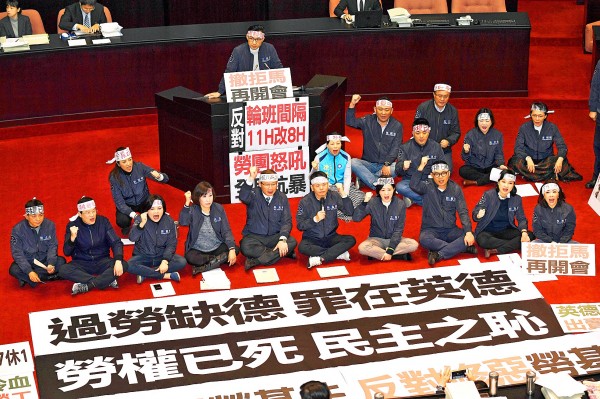《TAIPEI TIMES》 Lawmakers fail to reach consensus on labor articles

Chinese Nationalist Party (KMT) legislators spread banners and chant slogans on the floor of the Legislative Yuan in Taipei yesterday during deliberations on the government’s proposed amendment to Article 24 of the Labor Standards Act. Photo: CNA
By Sean Lin / Staff reporter
Despite intensive negotiations on Monday and yesterday morning, legislators failed to reach a consensus on several key articles before sending draft amendments to the Labor Standards Act (勞動基準法) to a plenary session for review.
After the New Power Party (NPP) caucus withdrew from cross-caucus talks on Monday evening to protest the proposed amendments, the Democratic Progressive Party (DPP), the Chinese Nationalist Party (KMT) and the People First Party (PFP) caucuses proceeded with the negotiations.
Despite lending support to the Executive Yuan’s proposal to calculate overtime fees by the actual number of hours worked — as opposed to the rule stipulating a minimum of four times an employee’s hourly wage — the caucuses sparred on how compensatory leave should be calculated if an employee chooses to convert overtime pay into compensatory leave.
According to the amendments passed in December 2016, employees should be paid 1.33 times their hourly rate during the first two hours of overtime and 1.66 times their hourly rate from the third hour onward.
KMT Legislator Chiang Wan-an (蔣萬安) said that it is unacceptable that the Cabinet proposed that the duration of compensatory leave granted should be tantamount to the number of hours overworked.
Since it had been established that overtime pay should be higher than the normal hourly wage, compensatory leave granted for overtime should also be longer, Chiang said.
He suggested that the act be amended to require employers to grant workers 1.5 hours of compensatory leave for every hour of overtime, or to deny employers the option to grant workers leave in lieu of overtime pay.
DPP Legislator Lin Shu-fen (林淑芬) took issue with draft article 38, which says that workers should be allowed to roll unused compensatory days to the next year after gaining the approval of their employers.
The stress that workers endure when working overtime is exponentially higher than during regular working hours; therefore, allowing them to accumulate compensatory leave for up to a year can pose serious health risks, Lin said.
Legislative Speaker Su Jia-chyuan (蘇嘉全), a DPP member, said that Lin could not know whether a worker hopes to roll their days off to the next year.
“Workers could become sick if they do not use their compensatory days off,” Lin replied. “Compensatory days off are not meant for workers to plan vacations so they can travel abroad. They already have their annual leave for that.”
A visibly irritated Su, who chaired the meeting, told Lin not to speak before obtaining his approval.
PFP caucus whip Lee Hung-chun (李鴻鈞) said that the Ministry of Labor proposed a “far-fetched” draft amendment that seeks to allow employers to tweak the “one day off every seven days” five-day workweek policy, as 42 sectors already adopt the four-week flexible schedule, which allows employers to bypass the five-day rule when arranging schedules as long as an employee’s monthly working hours do not exceed 160 hours and daily overtime does not exceed two hours.
The sectors were allowed to adopt flexible schedules after the ministry ascertained that their nature calls for a flexible schedule, making the draft amendment, which entails a similar review process, redundant, Lee said.
Su ruled that all eight draft amendments under review were to be sent to a plenary session for further discussion.
Executive Yuan Secretary-General Cho Jung-tai (卓榮泰) said that while lawmakers’ criticism was focused on employees having to work for more consecutive days, the amendment would also allow them flexibility to take more days off when they want to, referring to the draft regulation that would allow workers to trade overtime pay for compensatory leave.
新聞來源:TAIPEI TIMES















